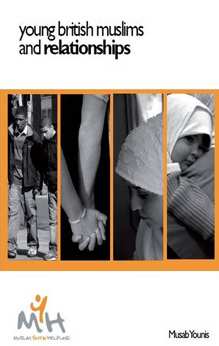
Author: Musab Younis
Publisher: Muslim Youth Helpline
Release Date: October 2010
Format: Paperback
Pages: 54
Source: No longer available on the website
The Muslim Youth Helpline (MYH) – founded by Mohammed Sadiq Mamdani in 2001 while he was still an undergraduate at Oxford – plays a unique and important role in Muslim civil society, offering counseling services to young persons . He set the framework for a self-sustaining venture which provides the only telephone help-line service to young Muslims. A similar project for Muslim women – the Muslim Womens’ Helpline – unfortunately folded up due to lack of funds some years ago. MYH has gained respect and credibility over the years, which is reflected in the advisory board that it has been able to assemble for steering Musab Younis’s project – these include distinguished academics and policy researchers such as Professor Louise Archer who has researched the attitudes of Muslim boys, Tufyal Choudhry, knowledgeable on the socio-economic conditions of Muslims in Britain, and Sughra Ahmed, who recently authored ‘Seen and Not Heard: Voices of Young British Muslims’ published by the Policy Research Centre at the Islamic Foundation, Leicester .
MYH possesses a unique source of quantitative data, the Electronic Logging System (ELS), “which provides a strictly confidential record of information for every call received. This includes the date and time of the call, the name of the helpline worker taking the call, the caller’s details (age, gender, ethnicity, and location), and the category and sub-category of the call. There is also space for detailed notes to be made by the helpline worker on the nature of each call and the suggestions made by the by the helpline worker on the nature of each call and the suggestions made by the helpline worker”. In this study, the ELS was supplemented with information obtained from a focus group of young people aged 14-21.
An analysis of ELS data has provided the following breakdown on the reasons of calls:
- Relationships 29%
- Health/mental health 21%
- Social life 8%
- Religion 6%
- Education 5%
- Other 31%
The report notes, “the biggest single concern for callers has consistently been ‘relationships’: boyfriends/girlfriends, marriage, parents, family or community – “yet very little research has been conducted on this topic.”
The ‘Relationships’ category includes parents, friends, marriage, divorce, sexual abuse and sexuality. Boy-girl concerns – “calls regarding a heterosexual relationship outside of marriage – are very common on the helpline, and constitute between one-fifth and one-third of all relationship calls, depending on the year. This suggests such relationships are not unusual and can be a significant cause for concern for young people from Muslim communities. The content of these calls varies across a range of issues including questions over the legitimacy of such relationships, the family and community pressure surrounding them, the problems and disagreements within a relationship itself, concern over the future of a relationship, and so on”.
The Report notes, “as well as relationships before marriage constituting a major topic, the helpline receives a substantial number of calls relating to marriage itself… This has remained a fairly steady concern on the helpline (at between 15–25 percent) through the years 2006–2009. Forced marriage has, seperately, been a consistent concern at around 4 percent of all enquiries per year. Taken together with boy-girl concerns these two issues alone sometimes represent 50 percent of all the relationship calls taken in a year.”
In a finding important for service providers, the report indicates that “participants criticised common stereotypes, such as an exaggerated notion that young Asian women lack freedom and have all choices made for them by male members of their family.” It also adds “if young British Muslims are reluctant to access support from the mainstream for fear of being misunderstood, the results are likely to be experiences of further isolation and marginalisation. Thus, meaningful engagement and support – which is faith and culturally sensitive – can be empowering and transformative, helping young British Muslims to overcome barriers to social inclusion and have better access to the services and ultimately opportunities that promote good psychological and emotional wellbeing”. The report includes a plea to institutions such as mosques: “community engagement for the sake of engagement is a powerful tool when seeking to help young people from ethnic communities that experience high levels of disadvantage and deprivation, and who are more than likely to be discriminated against compared to their counterparts and other ethnic minority groups”.
